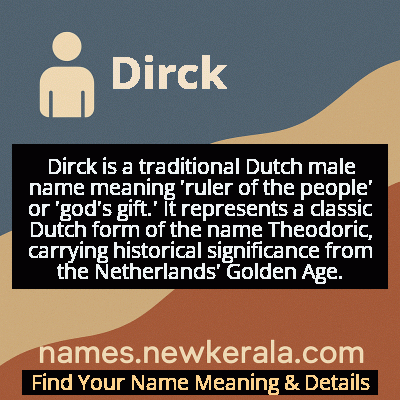Dirck Name Meaning & Details
Origin, Popularity, Numerology Analysis & Name Meaning of Dirck
Discover the origin, meaning, and cultural significance of the name DIRCK. Delve into its historical roots and explore the lasting impact it has had on communities and traditions.
Name
Dirck
Gender
Male
Origin
Dutch
Lucky Number
9
Meaning of the Name - Dirck
Dirck is a traditional Dutch male name meaning 'ruler of the people' or 'god's gift.' It represents a classic Dutch form of the name Theodoric, carrying historical significance from the Netherlands' Golden Age.
Dirck - Complete Numerology Analysis
Your Numerology Number
Based on Pythagorean Numerology System
Ruling Planet
Mars
Positive Nature
Generous, passionate, energetic, and humanitarian.
Negative Traits
Impulsive, impatient, moody, and can be overly emotional.
Lucky Colours
Red, maroon, scarlet.
Lucky Days
Tuesday.
Lucky Stones
Red coral, garnet.
Harmony Numbers
1, 2, 3, 6.
Best Suited Professions
Military, sports, philanthropy, leadership roles.
What People Like About You
Courage, energy, leadership, generosity.
Famous People Named Dirck
Dirck van Baburen
Painter
Prominent Dutch Caravaggisti painter known for his dramatic use of light and shadow
Dirck Barendsz
Painter
Renaissance painter and portraitist who studied in Italy and influenced Dutch art
Dirck Hartog
Explorer
Dutch sea captain who made the first recorded European landing on the west coast of Australia
Dirck Coornhert
Writer and Theologian
Influential Dutch humanist, theologian, and poet who advocated for religious tolerance
Name Variations & International Equivalents
Click on blue names to explore their detailed meanings. Gray names with will be available soon.
Cultural & Historical Significance
The name Dirck carries historical weight as it was commonly used among the merchant class and artistic circles during the Dutch Golden Age. It represents a connection to Dutch heritage and the Protestant work ethic that characterized the era. Many Dirck's were involved in the Dutch East India Company, artistic movements, and the development of Dutch urban culture, making the name symbolic of Dutch resilience, exploration, and cultural achievement.
Throughout Dutch history, the name Dirck has maintained its association with reliability and tradition. It appears frequently in historical records, family genealogies, and artistic works, serving as a cultural touchstone that connects modern Dutch identity with its rich historical past. The name's persistence through centuries demonstrates its enduring appeal and cultural significance within Dutch society.
Extended Personality Analysis
Individuals named Dirck are often perceived as practical, reliable, and grounded. They typically exhibit strong leadership qualities combined with a methodical approach to problem-solving. Their Dutch heritage often translates into traits associated with Dutch culture: directness, honesty, and a no-nonsense attitude toward life's challenges. They tend to be hardworking and value stability and tradition.
Dirck's are often seen as dependable friends and family members who approach relationships with loyalty and sincerity. They may possess an adventurous spirit tempered by practical considerations, reflecting the Dutch balance between exploration and pragmatism. Their communication style tends to be straightforward and honest, sometimes perceived as blunt, but always genuine. They value competence and often excel in fields requiring technical skill or systematic thinking.
These individuals typically demonstrate resilience in the face of adversity and approach life with a calm, determined demeanor. They often have a strong sense of responsibility and take their commitments seriously. While they may not be the most emotionally expressive, their actions consistently demonstrate care and dedication to those they value. Their traditional name often correlates with a respect for history and cultural heritage, which may manifest in interests ranging from genealogy to historical preservation.
Modern Usage & Popularity
In contemporary times, Dirck is considered a traditional and somewhat rare name, primarily used in the Netherlands and among Dutch communities abroad. While it has declined in popularity compared to its peak during the 17th century, it maintains a presence as a heritage name chosen by parents seeking to honor Dutch ancestry. The name is occasionally used in artistic and academic circles where traditional names are valued. Modern usage tends to be concentrated among families with strong connections to Dutch history and culture, and it's sometimes chosen as a distinctive alternative to more common Dutch names like Dirk or Diederik. Recent trends show a slight resurgence in traditional Dutch names, though Dirck remains relatively uncommon compared to its historical prevalence.
Symbolic & Spiritual Meanings
Symbolically, Dirck represents strength through practicality and heritage through tradition. The name embodies the Dutch values of resilience, exploration, and straightforwardness. It carries connotations of maritime adventure and artistic achievement, reflecting the dual nature of Dutch Golden Age culture. The name suggests a bridge between past and present, honoring ancestral roots while maintaining relevance in modern contexts. It symbolizes the balance between adventurous spirit and grounded pragmatism that characterized Dutch explorers and merchants. The name also represents cultural continuity and the preservation of historical identity in an increasingly globalized world.

